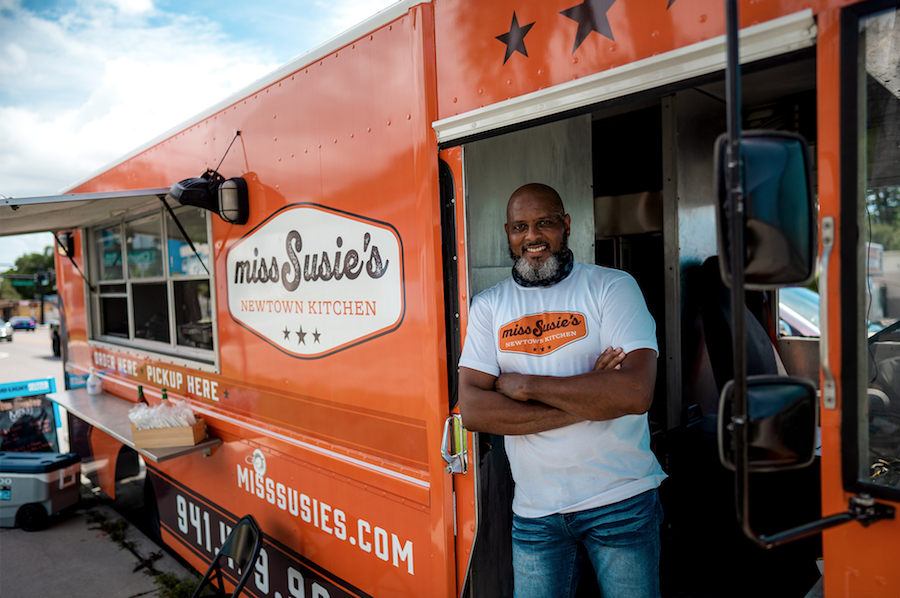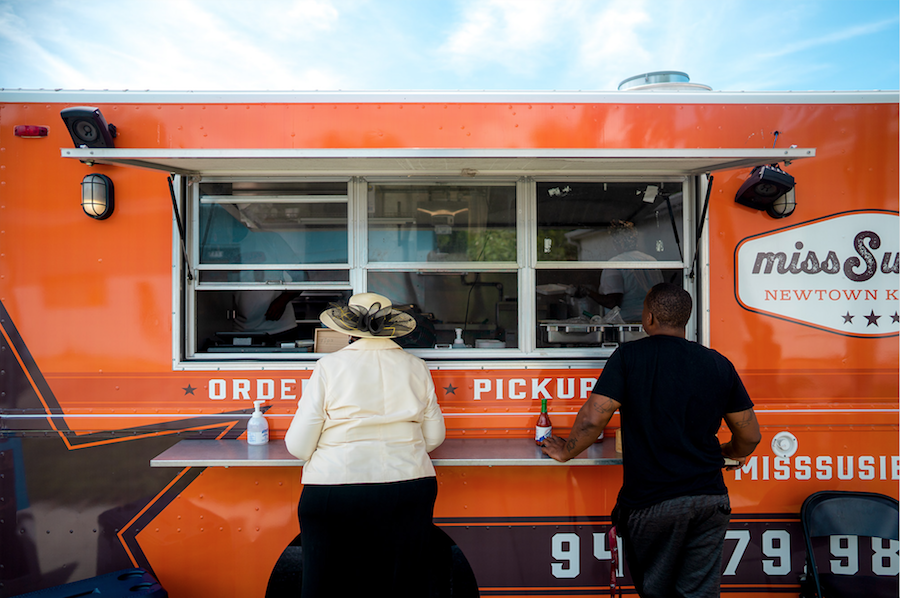With a heightened sense of empowerment within historically black communities themselves, the food scene in newtown is coming to life.
As a kid, you could hardly walk by the stoop of Miss Susie’s social cluB on Martin Luther King Jr. Way without incurring her wrath. Fredd Atkins, former mayor of Sarasota and 18-year city commissioner, remembers the air of intrigue surrounding the place. “She entertained the more sophisticated members of the community and didn’t want you seeing who was in there,” says Atkins, “and even if you walked by too slow,she’d come out and shoo you on.”

Miss Susie operated within a thriving Newtown community and, rumor had it, she even had a similar establishment in Polk County. This enterprising woman, a devout member and patron of the New Bethel Baptist Church, represented the spirit of striving, one that characterized Sarasota’s Black community and helped its residents find a measure of prosperity in a small seaside slice of the segregated South. Atkins remembers a handful of other dining establishments helmed by misses. “Miss Winnie’s used to sell hot dogs for 10 and 15 cents, depending on the size, and burgers for 25 cents,” says Atkins, “then you had Miss Solomon’s and Miss Saver’s where you could get something to eat.” Of course, part of the success of these establishments was a market hemmed in by Jim Crow-era laws that prohibited Sarasota’s Black residents from patronizing businesses outside of Newtown. According to Atkins, even in the 80s, years after Sarasota was no longer segregated by legislative decree, it ranked 13th in the country in the stark delineation of its residents by race. “To this day, the railroad tracks still feel like a boundary to me,” says Atkins.

The moral and ethical imperative of desegregation is unquestionable, but it was not without its unintended consequences. Once the residents of Newtown were allowed to go spend their money outside of the community, many homegrown businesses floundered. “One of my biggest struggles is trying to explain to people that desegregation hardly guaranteed Black folks were doing better,” says Atkins. And, at the same time that the hard-earned money of Newtown residents went elsewhere, Sarasotans’ unwillingness to do business in Newtown compounded the economic pressure. It all signaled the slow decline of Black-owned restaurants in the Newtown community. Some hung on, like Town Hall Restaurant and Lounge, while others found new incarnations, like Jamaican American Soul Food on 301 and MLK Way, which used to host Black blues acts as part of the Chitlin’ Circuit when the establishment was a nightclub called The Manhattan and owned by Newtown resident, Johnny Simpson.

Today, spurred in part by growing movements to support more Black-owned businesses, greater investments by local and national governments in historically Black communities, and a heightened sense of empowerment within those communities themselves, the food scene in Newtown is coming to life. “It certainly has the feeling of a rebirth,” says Atkins. That rebirth looks like the Sarasota Newtown Farmer’s Market, which offers fresh produce to the Newtown community on Fridays and Saturdays as well as provides a venue for small businesses to showcase their goods. That rebirth looks like Stroke’s Seafood at 2745 Osprey Avenue, which cranks out seafood and comfort food seven days a week, with shrimp and grits for breakfast, burgers and fried fish sandwiches for lunch, and all manner of lobster, snow crab and shrimp combinations in the evening.

That rebirth is also embodied by Samantha Koch, who opened up her food truck, C & D’s Sandwich Shop, as a bit of a leap of faith. She had a career in the healthcare industry for 14 years before falling out of love with her job. Born and raised in Pennsauken, New Jersey, she grew up eating cheesesteaks and pizza of a variety she couldn’t find in Sarasota. With a passion for cooking and a dream to chase after, she set out to offer the city her hometown favorites. “I just really missed that food,” says Koch, “and it’s such a joy to share it with people here and see them light up.” And the early success of her sandwich operation came in spite of the pandemic. “I was building out the truck for a year and a half,” says Koch, “and low and behold, I finish and open and it’s ‘hello, COVID.’” But, bolstered by steady pedestrian and car traffic on MLK Way, where she operates her sandwich shop, she quickly found an audience for her mouthwatering assortment of hoagies, from jerk chicken cheesesteaks to sausage and peppers.

“There wasn’t really much on MLK in terms of food when I moved here almost 20 years ago,” she says, “and I hope more people in the neighborhood try and open up their own places so we get more variety without having to go somewhere else in town.” To that end, the story comes back to Miss Susie—not the resurrected ghost of the intrepid business owner from Atkins’ days, but a new incarnation with a similar spirit. Miss Susie’s Newtown Kitchen broke ground to much fanfare several years ago. Named in honor of the original matriarch, the restaurant project centered on soul food with a community-centric twist. The brainchild and passion project of the late Steve Seidensticker, founder of the Tableseide Restaurant Group and its philanthropic Tableseide Cares organization, the restaurant was supposed to help usher in an economic revitalization of Newtown. Promising to hire from within the community while also offering job training for area youths, the project stalled due to financial shortcomings in the sad and untimely wake of Seidensticker’s passing. But the project is back on track, spearheaded by Seidensticker’s family and with renewed support from philanthropic and City of Sarasota entities.
“Lisa and Andrew Seidensticker had been asking me if I’d be interested in creating the menu for Miss Susie’s Newtown Kitchen for a while,” says Executive Chef Golden Monix. “Once they started talking about how they wanted to help the community and give back to the business district, I was all in.” Though considerably younger than Atkins, Monix also remembers the original Miss Susie’s, the way he and his friends would all wonder about the goings on inside. A football scholarship sent him to Arkansas Tech after graduating from Riverview High School. He worked in athletics following college, working his way up to Unit Director for Boys and Girls Club of Sarasota County. “But I always had a passion for cooking, so I went back to Johnson and Wales in Charlotte, NC and have worked my way up through restaurant and catering jobs,” Monix says.
As Monix and the Seidenstickers await the completion of the brick-and-mortar restaurant at the site of the former Miss Susie’s Social Club, they’ve built a food truck they can use as a lab to try out prospective menu items. Blackeyed peas with smoked turkey, pork chop sandwiches, baked beans, cornbread and other soul food favorites are what they hope to nourish and revitalize the community with. A 16-week job training program created in conjunction with Suncoast Technical College will seek to train and place its students in hospitality jobs in Sarasota and beyond. “In the short term, I would love for Miss Susie’s to be a hub or anchor for the community,” says Monix, “but long term, I hope it helps build up the community.” In the meantime, the community is already doing a fine job of evoking the spirit of Miss Susie, laying a foundation for more growth and activation in a neighborhood with a long history of perseverance and prosperity.









